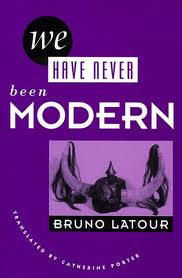If any book has ever changed the way I think, it would be Bruno Latour's "We Have Never Been Modern". It is a complex argument with a lot of fascinating implications that philosophers are still working out.
In this book, Latour describes modernity - our contemporary way of thinking, living, and asking questions - as being founded on a particular 'constitution' or set of rules that have come to be taken for granted, but that turn out to be self-contradictory and groundless when we examine them. The reason is that we 'moderns' only think consciously about one part of the constitution at a time, and so the contradictions escape us - we believe we are actually being consistent.
Central in Latour's analysis of modernity is our attempt to separate Nature from Society. Nature stands for everything that simply is what it is, whether we would like to change it or not. Society stands for all that is human, human-made and artificial, that we might construct otherwise if we choose to. What Latour shows is that Nature and Society aren't really that easy to separate in reality, even though the moderns treat them as if they are already separate.
For example, a scientist in a laboratory claims to be seeing Nature as it is, apart from any human construction. But he can only confirm what Nature is in itself through the agreement of a community of scientists in a human-made laboratory. They construct an environment and a consensus that Nature is a particular way. This way, Nature is founded on Society. But this can be reversed. The science of Society tells us that humans can construct whatever society we like, and that this is our liberty. But in order to base her argument on something, the social scientist refers to sociological 'laws' that echo the natural 'laws' of the laboratory. Society is then ultimately founded on Nature.
We, the 'moderns', are only able to look at one of these at the time, and so we don't realize the inconsistency. In fact, Latour says, there has never actually been a clear separation between Nature and Society. But for as long as we have told ourselves that we manage to make that separation, we have remained blind to the many 'hybrid' things in the world that belie our categories. In this sense we have never been modern - for we have never actually separated Nature from Society.
Latour shows how our views of God, history, time, materiality, ideas, etc. are all connected to the modern 'constitution', and also how the questions regarding all of these are re-opened when we realize just how unsustainable is the modern way of thinking and practicing. We cannot forever keep on acting as if the separation of Nature and Society is possible, but all our modern practices are tangled up in this misconception.
After having argued that we have never been modern, Latour then has to explain what then we have actually been. In other words, he must give us an alternative way of thinking about the world. This is the basis for what has become loosely known as 'Actor-Network Theory', even though Latour himself is not too fond of that particular label.
The details of this philosophical system is a bit too complex for this post. Generally, it is used as if it simply means giving more attention to the material objects involved in human societies, but Latour's metaphysics are a bit more radical than that. While Latour's view of the world has recently been taken up by confessional atheist philosophers as a kind of 'deep' materialism, his metaphysics also invites a sacramental, trinitarian, catholic theology. In a later post, I hope to show how this is the case.


No comments:
Post a Comment